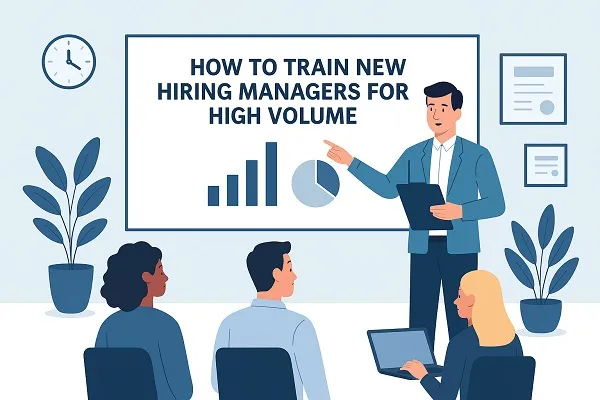Training new hiring managers for high-volume recruitment is essential to ensure they make consistent, data-driven decisions and maintain candidate quality without sacrificing speed. In high-growth environments, especially in industries like retail, logistics, healthcare, or customer service, a structured training approach for hiring managers becomes crucial.
Without proper preparation, new managers can feel overwhelmed by the pressure of filling multiple roles quickly, leading to rushed decisions, candidate drop-off, or poor hires. Here’s how to effectively train new hiring managers to thrive in high-volume hiring scenarios.
Build a Strong Foundation Before Hiring Starts
Onboard Hiring Managers Like You Do New Employees
New hiring managers should undergo a structured onboarding process that mirrors what top-performing organizations do for new employees. That includes:
- A comprehensive overview of the hiring process
- Insights into the company’s mission, culture, and ideal candidate profiles
- Clear expectations and metrics tied to hiring success
Introduce the Full Hiring Workflow
Before the first candidate interview is ever scheduled, ensure your hiring managers fully understand:
- Each step of your recruitment funnel
- Time-to-fill and quality-of-hire metrics
- Where hiring manager input is most critical (e.g., screening, interviews, decision-making)
Emphasize Consistency and Compliance
High-volume hiring requires repeatable systems to avoid legal risk and ensure fair hiring practices.
Teach Legal and Ethical Hiring Practices
Hiring managers should be trained in:
- Anti-discrimination laws and bias awareness
- Proper documentation and candidate evaluation practices
- Structured interviewing techniques to ensure fairness
Use role-playing and real-world scenarios to reinforce learning and compliance.
Standardize Evaluation Tools
Train managers to use:
- Structured interview guides
- Skills rubrics
- Scorecards for post-interview debriefs
These tools reduce unconscious bias and make comparisons easier when dealing with dozens or hundreds of candidates.
Leverage Data and Metrics

Make Metrics Actionable
Hiring managers often don’t need to know every recruiting KPI, but they should be trained on:
- How to interpret time-to-hire and offer acceptance rates
- Understanding funnel conversion metrics (e.g., how many screened candidates become hires)
- How their actions (delayed feedback, slow scheduling) affect the pipeline
Make dashboards easy to understand and review data during regular check-ins.
Focus on Speed Without Sacrificing Quality
High-volume recruiting doesn’t just mean hiring fast — it means hiring efficiently.
Train for Time Management
Help hiring managers prioritize hiring alongside their day jobs. Offer guidance on:
- Blocking time on calendars for interviews and feedback
- Delegating non-essential tasks to recruiting coordinators
- Using templates and scheduling tools to reduce admin burden
Teach the “80/20” Approach to Candidate Review
Instead of over-analyzing every resume, train managers to:
- Use must-have vs. nice-to-have criteria
- Rely on recruiter pre-screens for initial vetting
- Move strong candidates through the pipeline without delay
Provide Interview Coaching and Tools
Use Role-Play to Practice Interviewing
Practice makes perfect — especially when new hiring managers haven’t interviewed candidates before.
Use mock interviews to help managers:
- Get comfortable with behavioral interviewing techniques
- Learn how to listen more than they talk
- Practice probing questions without leading the candidate
Supply Interview Templates
Equip managers with:
- Interview scorecards for each role
- A list of core competencies tied to job requirements
- Sample questions aligned with role expectations and company values
Having this structure helps speed up the process while keeping the quality bar high.
Strengthen Collaboration Between Recruiters and Hiring Managers

Train Managers on Their Role in the Partnership
Hiring isn’t just a recruiting responsibility — it’s a team effort.
Make sure new hiring managers understand:
- What recruiters will own (sourcing, screening, coordination)
- What’s expected from them (availability, interview input, decision-making)
- The importance of fast communication throughout the hiring cycle
Build Communication Rituals
Create feedback loops through:
- Weekly syncs between recruiters and hiring managers
- Clear SLAs (e.g., provide interview feedback within 24 hours)
- Shared candidate trackers or ATS access
Collaboration improves quality and speeds up time-to-fill.
Prepare for Volume Surges and Scaling
Create Ready-to-Go Hiring Kits
To help hiring managers ramp faster during peak periods, offer:
- Pre-written job descriptions
- Email templates for candidate communication
- Lists of pre-approved sourcing channels or talent pools
Train in Batches or Cohorts
If you’re onboarding several new hiring managers, group training can:
- Standardize understanding
- Foster peer support and shared learning
- Enable trainers to scale their efforts
Follow up with 1-on-1 coaching to reinforce concepts where needed.
Offer Ongoing Support and Feedback
Set Up Checkpoints and Review Sessions
Don’t stop training after the first week. Offer ongoing feedback through:
- Bi-weekly or monthly review sessions
- Interview shadowing and reverse-shadowing (where a TA leader joins)
- Review of hiring metrics and candidate feedback
Provide a Learning Hub or Resource Library
Make it easy for hiring managers to self-educate between sessions. Create a central place for:
- Hiring guides
- Interview templates
- Compliance resources
- Best practices videos or job aids
Encourage a Candidate-First Mindset

Reinforce the Importance of the Candidate Experience
Even at high volume, candidate experience matters.
Teach hiring managers to:
- Be responsive and respectful in communication
- Personalize interactions where possible
- Keep interviews engaging and relevant
Poor experiences can lead to drop-offs — which only increases workload later.
When new hiring managers are trained thoughtfully for high-volume recruiting, they become confident decision-makers who reduce time-to-hire, improve team collaboration, and raise the overall quality of hires. The investment you make in training today pays off in stronger, faster, and more scalable hiring tomorrow.
Content reviewed and published by Tier2Tek Staffing Editorial Team .

